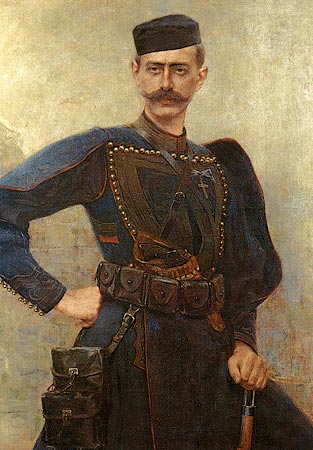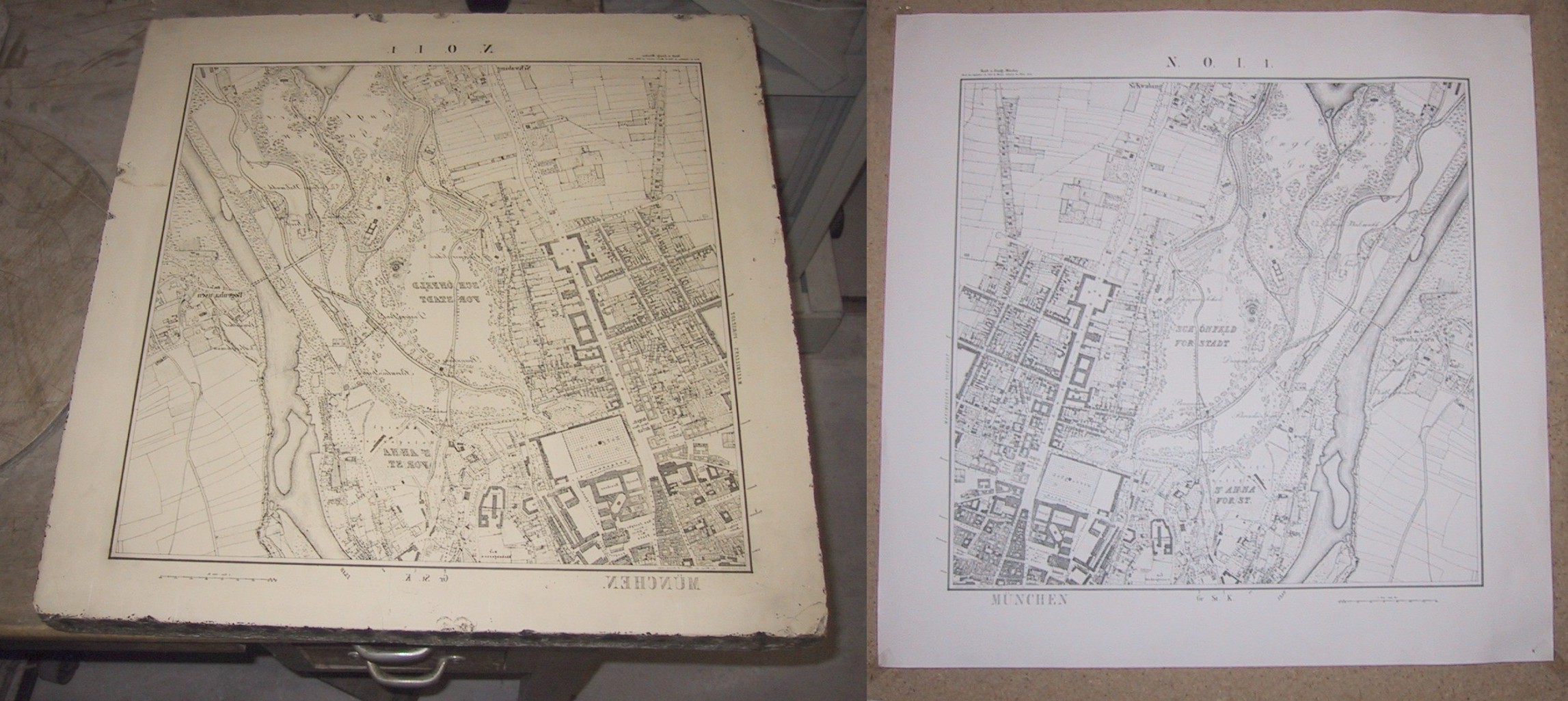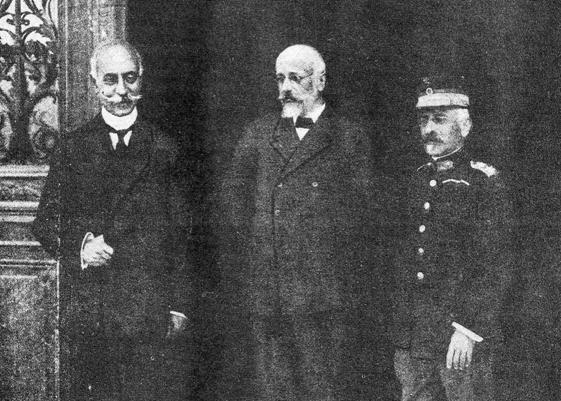|
Goudi Coup
The Goudi coup () was a military coup d'état by a group of military officers that took place on the night of , at the barracks in Goudi, located on the eastern outskirts of Athens, Greece. The coup was pivotal in modern Greek history, ending the old political system and ushering in a new period for Greece. The coup occurred under simmering tensions in Greek society, which reeled under the effects of a lack of necessary reforms and financial troubles that had been exacerbated by the defeat in the Greco-Turkish War of 1897. Emulating the Young Turks, several junior army officers founded a secret society, the Military League. With Colonel Nikolaos Zorbas as their figurehead, on the night of 15 August, the Military League, having gathered together its troops in the Goudi barracks, issued a '' pronunciamiento'' to the government, demanding an immediate turnaround for the country and its armed forces. King George I gave in and replaced Prime Minister Dimitrios Rallis with Kyriako ... [...More Info...] [...Related Items...] OR: [Wikipedia] [Google] [Baidu] |
Lithograph
Lithography () is a planographic method of printing originally based on the miscibility, immiscibility of oil and water. The printing is from a stone (lithographic limestone) or a metal plate with a smooth surface. It was invented in 1796 by the German author and actor Alois Senefelder and was initially used mostly for sheet music, musical scores and maps.Meggs, Philip B. ''A History of Graphic Design''. (1998) John Wiley & Sons, Inc. p 146, .Carter, Rob, Ben Day, Philip Meggs. ''Typographic Design: Form and Communication'', Third Edition. (2002) John Wiley & Sons, Inc. p. 11. Lithography can be used to print text or images onto paper or other suitable material. A lithograph is something printed by lithography, but this term is only used for printmaking, fine art prints and some other, mostly older, types of printed matter, not for those made by modern commercial lithography. Traditionally, the image to be printed was drawn with a greasy substance, such as oil, fat, or wax on ... [...More Info...] [...Related Items...] OR: [Wikipedia] [Google] [Baidu] |
Coup D'état
A coup d'état (; ; ), or simply a coup , is typically an illegal and overt attempt by a military organization or other government elites to unseat an incumbent leadership. A self-coup is said to take place when a leader, having come to power through legal means, tries to stay in power through illegal means. By one estimate, there were 457 coup attempts from 1950 to 2010, half of which were successful. Most coup attempts occurred in the mid-1960s, but there were also large numbers of coup attempts in the mid-1970s and the early 1990s. Coups occurring in the post-Cold War period have been more likely to result in democratic systems than Cold War coups, though coups still mostly perpetuate authoritarianism. Many factors may lead to the occurrence of a coup, as well as determine the success or failure of a coup. Once a coup is underway, coup success is driven by coup-makers' ability to get others to believe that the coup attempt will be successful. The number of successful cou ... [...More Info...] [...Related Items...] OR: [Wikipedia] [Google] [Baidu] |
Convention Of Constantinople (1881)
The Convention of Constantinople was signed between the Kingdom of Greece and the Ottoman Empire on 2 July 1881, resulting in the cession of the region of Thessaly (apart from Elassona) and a part of southern Epirus (the Arta Prefecture) to Greece. Background With the outbreak of the Great Eastern Crisis in 1875, many in Greece saw an opportunity for realizing the '' Megali Idea'' and expanding the borders of the country northward at the expense of the Ottoman Empire. At the same time, the Greek leadership from King George I was aware that the Great Powers, and especially Great Britain, did not favour such adventures; consequently Greece adopted a more cautious stance, particularly given its military unpreparedness. This passivity was reinforced by the fear of Pan-Slavism engendered by the recent crisis over the establishment of the Bulgarian Exarchate, which led to distrust towards suggestions for a co-operation of all Balkan states, particularly by King George. Proposals by ... [...More Info...] [...Related Items...] OR: [Wikipedia] [Google] [Baidu] |
Congress Of Berlin
At the Congress of Berlin (13 June – 13 July 1878), the major European powers revised the territorial and political terms imposed by the Russian Empire on the Ottoman Empire by the Treaty of San Stefano (March 1878), which had ended the Russo-Turkish War of 1877–1878. The Congress was the result of escalating tensions; particularly British opposition to Russian hegemony over the Ottoman Empire in the Balkans, through the creation of a Russian-aligned ' Greater Bulgaria'. To secure the European balance of power in favour of its splendid isolation achieved after the Crimean War, Britain stationed the Mediterranean Fleet near Constantinople to enforce British demands. To avoid war, Otto von Bismarck, Chancellor of the newly formed German Empire, was asked to mediate a solution that would restore the Ottoman Empire's position as a counterbalance to Russian influence in the Mediterranean and the Balkans, in line with the principles of the 1856 Treaty of Paris. Attended by d ... [...More Info...] [...Related Items...] OR: [Wikipedia] [Google] [Baidu] |
National Schism
The National Schism (), also sometimes called The Great Division, was a series of disagreements between Constantine I of Greece, King Constantine I and Prime Minister Eleftherios Venizelos over Kingdom of Greece, Greece's foreign policy from 1910 to 1922. The central issue was whether Greece should join World War I, with Venizelos advocating for alignment with the Allies of World War I, Allies, while the king supported neutrality that favored the Central Powers. This personal conflict between the two men had far-reaching consequences, as it raised questions about the king's constitutional role in the state and eventually led to a deep division within Greek society. After Kingdom of Bulgaria, Bulgaria had entered the war against Kingdom of Serbia, Serbia (already besieged by German Empire, Germany's and Austria-Hungary's combined attack), in September 1915, Venizelos achieved a vote on October 4 in the parliament for a call to conscription, honoring the Greek–Serbian Alliance ... [...More Info...] [...Related Items...] OR: [Wikipedia] [Google] [Baidu] |
Prime Minister Of Greece
The prime minister of the Hellenic Republic (), usually referred to as the prime minister of Greece (), is the head of government of the Greece, Hellenic Republic and the leader of the Cabinet of Greece, Greek Cabinet. The officeholder's official seat (but not residence) is the Maximos Mansion in the centre of Athens. After the Executive State (Greece)#Presidency of the Government, Presidency of the Government () was established, the office is referred to either as Prime Minister or President of the Government (). Election and appointment of the prime minister The prime minister is officially appointed by the president of Greece. According to Article 37 of the Constitution of Greece, Greek Constitution, the President of Greece, president of the Hellenic Republic shall appoint the leader of the political party with the parliamentary majority, absolute majority of seats in the Hellenic Parliament, parliament as prime minister. If no party has the parliamentary majority, ab ... [...More Info...] [...Related Items...] OR: [Wikipedia] [Google] [Baidu] |
Greek Legislative Election, November 1910
Parliamentary elections were held in Greece on , following elections in August.Dieter Nohlen & Philip Stöver (2010) ''Elections in Europe: A data handbook'', p829 The Liberal Party won 307 of the 362 seats. Eleftherios Venizelos remained Prime Minister, having assumed office on 18 October.Nohlen & Stöver, p868 Results References {{Greek elections 1910 11 History of Greece (1909–1924) Greece Parliamentary In modern politics and history, a parliament is a legislative body of government. Generally, a modern parliament has three functions: Representation (politics), representing the Election#Suffrage, electorate, making laws, and overseeing ... Eleftherios Venizelos ... [...More Info...] [...Related Items...] OR: [Wikipedia] [Google] [Baidu] |
Greek Legislative Election, August 1910
Parliamentary elections were held in Greece on .Dieter Nohlen & Philip Stöver (2010) ''Elections in Europe: A data handbook'', p829 Eleftherios Venizelos had begun to dominate the political life of the country. He was listed as a candidate by his followers and was elected with the most votes at the Attica-Boeotia constituency. The United Parties won 211 of the 362 seats. Stefanos Dragoumis remained prime minister until his resignation on , when Venizelos became prime minister.FEK A 313/1910, http://www.et.gr/idocs-nph/search/pdfViewerForm.html?args=5C7QrtC22wGjMvHQD_V6sndtvSoClrL8VUSpgL_HkaB5MXD0LzQTLWPU9yLzB8V68knBzLCmTXKaO6fpVZ6Lx9hLslJUqeiQtpS7TPdBQw2IGgm0thEXOLSYFQ28-sUNpae5KH0Ix3k Because Venizelos did not have the confidence of Parliament, he agreed with King George to dissolve parliament. Fresh elections were held in November. Results References {{Greek elections 1910 08 History of Greece (1909–1924) Greece Parliamentary In modern politics and ... [...More Info...] [...Related Items...] OR: [Wikipedia] [Google] [Baidu] |
Hellenic Parliament
The Parliament of the Hellenes (), commonly known as the Hellenic Parliament (), is the Unicameralism, unicameral legislature of Greece, located in the Old Royal Palace, overlooking Syntagma Square in Athens. The parliament is the supreme democratic institution that represents the citizens through an elected body of Members of Parliament (MPs). It is a unicameral legislature of 300 members, elected for a four-year term. From 1844–1863 and from 1927–1935, the parliament was Bicameralism, bicameral with an upper house (the Greek Senate, Senate; ) and a lower house (the Chamber of Deputies; ). Several important Greek statesmen have served as the speaker of the Hellenic Parliament. History Semi-constitutional monarchy, 1843–1862 The first national parliament of the independent Greek state was established in 1843, after the 3 September 1843 Revolution, 3 September Revolution, which forced Otto of Greece, King Otto to grant a Greek Constitution of 1844, constitution. The con ... [...More Info...] [...Related Items...] OR: [Wikipedia] [Google] [Baidu] |
Pronunciamiento
A is a form of military rebellion or coup d'état particularly associated with Spain, Portugal and Ibero-America, especially in the 19th century. Typology The is one category of praetorianism: the practice of military figures acting as political actors in their own right, rather than as the politically-neutral instrument of civilian government. In a classic coup d'état a rebel faction which controls some critical element of the armed forces seizes control of the state by a sudden movement, organized and executed in stealth. A , in contrast, is by definition a public performance designed to rally public opinion to a dissident faction. A group of military officers, often mid-ranking, ''publicly'' declare their opposition to the current government (head of state and/or cabinet, who may be legally elected civilians or the result of a previous coup). are normally 'bloodless' or close to it, intending to bring about a change in government or regime by ''threatening'' violence an ... [...More Info...] [...Related Items...] OR: [Wikipedia] [Google] [Baidu] |
Young Turks
The Young Turks (, also ''Genç Türkler'') formed as a constitutionalist broad opposition-movement in the late Ottoman Empire against the absolutist régime of Sultan Abdul Hamid II (). The most powerful organization of the movement, and the most conflated, was the Committee of Union and Progress (CUP, founded in 1889), though its goals, strategies, and membership continuously morphed throughout Abdul Hamid's reign. By the 1890s, the Young Turks were mainly a loose and contentious network of exiled intelligentsia who made a living by selling their newspapers to secret subscribers. Included in the opposition movement was a mosaic of ideologies, represented by democrats, liberals, decentralists, secularists, social Darwinists, technocrats, constitutional monarchists, and nationalists. Despite being called "the Young Turks", the group was of an ethnically diverse background; including Turks, Albanian, Aromanian, Arab, Armenian, Azeri, Circassian, Greek, Kurdish, and Je ... [...More Info...] [...Related Items...] OR: [Wikipedia] [Google] [Baidu] |
Greco-Turkish War (1897)
The Greco-Turkish War of 1897 or the Ottoman-Greek War of 1897 ( or ), also called the Thirty Days' War and known in Greece as the Black '97 (, ''Mauro '97'') or the Unfortunate War (), was a war fought between the Kingdom of Greece and the Ottoman Empire. Its immediate cause involved the status of the Ottoman Crete, Ottoman province of Crete, whose Greek-majority population had long desired union with Greece. Despite the Ottoman victory on the field, an autonomous Cretan State under Ottoman suzerainty was established the following year (as a result of the intervention of the Great Powers after the war), with Prince George of Greece and Denmark as its first High Commissioner. The war put the military and political personnel of Greece to test in an official open war for the first time since the Greek War of Independence in 1821. For the Ottoman Empire, this was also the first war-effort to test a re-organized military system. The Ottoman Army (1861–1922), Ottoman army operate ... [...More Info...] [...Related Items...] OR: [Wikipedia] [Google] [Baidu] |






